#modality in Japanese
Text
~べき vs ~たほうがいい
How to say should in Japanese
part I don’t even know which one because Japanese is so nuanced, I can’t honestly…
We should tell him the truth.
This sentence can be translated to:
彼に真実を言うべきだ。
彼に真実を言った方がいい。
べき is very strong, broadly speaking. It sounds bossy and commanding.
た方がいい, on the other hand, sounds softer like a suggestion.
Which translation to chose also depends on the action itself. In some cases, it’s better to give people suggestions because no one knows what the right thing to do is. But there are situations when we all instinctively know what to do, be it societal unspoken agreements or just pure morality.
If you truly believe that revealing the truth to your friend is the right thing to do because keeping him in the dark will do more harm than good, then go for べき. After all, everyone deserves to know the truth.
In some other cases, べき can make you sound like you’re the ‘wise one.’ You know what to do, and your words should be obeyed. You’re strongly convinced that whatever you’re saying is the right thing to do. It could also sound like it is your obligation to perform the action. As always, everything depends on the context.
However, if you have an idea, a suggestion, but you’re not really sure what to do in the end, and you don’t want to sound extra bossy, then た方がいい would be your choice. In this example, た方がいい can suggest “we better do it because if he doesn’t learn the truth, shit will go down real fast” - depending on the context of course.
べき is usually explained as たほうがいい in some dictionaries, but then in some cases you can’t use them interchangeably.
Your friend is in doubt about her work. Her work is mentally draining. She needs some advice. She asks:
どうしたらいい? - what should I do? (or more literally, what’s the best thing to do? Btw, yet another phrase that can be translated to should in English… ugh. Also, you don’t ask yourself with たほうがいい)
You say:
You should quit your work.
You could also say:
It’d be best, if you just quit your work.
Well, quitting your work, doesn’t sound like the worst idea.
Why don’t you quit your work?
Should is used to give advice, or at least that’s what ESL textbooks teach us. However, there are other phrases to advise people. Which one you’ll use in English depends on your conviction, relation with that person, and some other factors.
Should, according to Macmillan dictionary, is used to say:
used for talking about what is right, sensible, or correct
used for saying or asking about the right or sensible thing to do or the right way to behave
If your friend’s work is mentally draining, then the sensible thing to do is to quit it. Seems just fine in English. Does it make you sound bossy in English? I’m not the one to decide because I’m not a native speaker, but I’ve heard such pieces of advice from my friends, and it didn’t sound bossy at all, just the voice of reason.
In Japanese, though, well… since it is a nuanced language, some people will definitely see you as a bossy person if you use べき on them. (confirmed with some native speakers)
べき in some grammar books is primarily listed with other phrases conveying ‘obligation’ ぎむ
So translating ‘you should quit your work’ to 仕事は辞めるべきだ isn’t the best idea.
仕事は辞めた方がいい, though, sounds like you’re giving a piece of (friendly) advice without trying to command your friend.
My Japanese teacher’s Japanese teacher, who is a native, says that べき may sound like “don’t tell me how to live my life!” But if you see someone struggling with some situation, and they don’t know what to do, and you want to give them a little push, using べき wouldn’t be so bad. It could be interpreted as a genuine try to help someone, but the context must be just right.
I’m discussing affirmative sentences, but the same logic applies to negatives as well.
Side note: In my business writing classes, our teacher told us to limit the use of should to an absolute minimum because it’s too vague in a lot of situations. If I told my little brother, “you should clean your room”, he would understand it as a very weak suggestion that he doesn’t even have to consider.
But if told him, “Well, I think I should buy this new game for you”, he would understand it as “I’m getting a new game!”
He told us to be precise as much as possible. If by should we mean ‘do it now’, use a phrase that conveys an order.
So I think the best way to accurately translate should into Japanese is knowing what we really want to say.
6 notes
·
View notes
Text
~んだから grammar
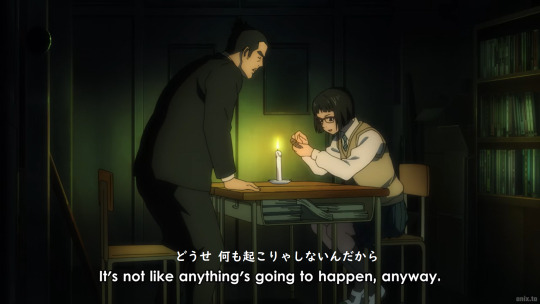
どうせ 何も起こりゃしないんだから
Context: Sasaki to Iguchi when they were at school, and he wanted to turn on the lights. She said that turning on the lights would ruin the atmosphere, which is important - they are in the occult club, after all.
Enjoying the thrill is the spirit of the occult club, isn’t it?
It’s not like anything is going to happen, anyway.
起こりゃしない:
りゃ is a spoken form of りは.
起こり is pre-masu form of 起こる (おこる) = to happen
~はしない is a stressed form of a negative form of a verb. It just makes the sentence stronger.
pre-masu form + はしない = a very strong statement.
どうせ = anyhow; in any case; at any rate; after all; at all; no matter what
~の / んだから
Another example is here
Hedgehog-Japanese.com explains this grammar in the following way:
The "A nodakara B" is used to state a reason. It is the same as ”A kara B" in terms of being used to state a reason, but there are restrictions on what can be placed in "A" and "B." The "A" contains a reaffirmation of something that the listener already knows, and the ”B” contains advice, commands, requests, etc., or the speaker's opinion to persuade the listener, or the speaker's opinion with which he or she wants the listener to agree or concur.
"A ndakara B" has the same meaning, but "nondakara" is used more often in spoken language.
Following this definition, we can say that:
With “It’s not like anything is going to happen, anyway” Sasaki is reaffirming both of them. They both assumed that unwrapping Sukuna’s finger wouldn’t cause any danger, sometime before they went to school at night. Now she’s just articulating a fact they both ALREADY know.
Whether “Enjoying the thrill is the spirit of the occult club, isn’t it?” is closely related to the sentence from the picture, I can’t tell. However, it does sound like Sasaki is stating her opinion, and she wants Iguchi to agree.
19 notes
·
View notes
Text
youtube
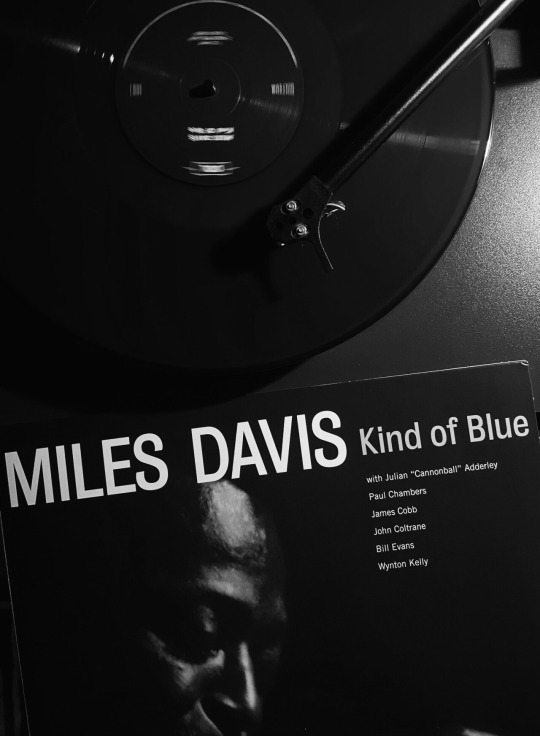
Kind of Blue is arguably Miles’ greatest hit, the one album with which he is most associated. It is still one of the most popular jazz albums of all time, outselling most contemporary recordings and prized as a harbinger of modal jazz and revered as a paradigm of improvisation over reduced harmony—creating a perfect balance of sound and space. Outside the jazz realm, it is consistently chosen by music historians and critics as one of the best albums of all time, alongside evergreen classics by The Beatles, Elvis Presley, and others.
Inspired by many ideas—mood-painting, modal structures—behind the soundtrack to Elevator to the Gallows, Kind of Blue can be seen as Miles’ signature work not only in its enduring popularity, but its attitude as well; in many ways the album’s cool and aloof effect, with its minimal, almost dismissive musical gestures, serves as a sonic reflection of Miles legendary aloofness. The title of its famous opening track—“So What”—is a perfect reflection of Miles’ insouciant, sunglasses-at-midnight way of being.
Numerous other elements specific to Kind of Blue push it to the top of the “Best Of” lists: the all-star sextet Miles had assembled to accompany him, including three players (John Coltrane, Bill Evans, Cannonball Adderley) who would themselves prove to be jazz legends, and a rhythm section (Wynton Kelly, Paul Chambers, Jimmy Cobb) that outswung any other in its day. There was the shared feeling of fresh discovery in the studio on those two days in 1959, as almost all the tracks were the first complete takes—no edits, no second tries. There was Bill Evans’ evocative essay on the album’s back cover highlighting that idea of “first-mind, best-mind”, comparing their music to the spontaneous, unerasable ink-on-rice-paper work of a Japanese calligrapher.
Miles Davis
60 notes
·
View notes
Text
"Is the Berlin Interpretation still relevant?" Part 10 - Results
So, I guess I should finally explain what I'm talking about. I promise I'll stop spamming these tags now.
The Berlin Interpretation of Roguelikes is a genre definition that was made at a roguelike dev conference in 2008. It was a handful of people who were inspired by Rogue to make their own procedural death labyrinths. This was just before Spelunky. It was before The Binding of Isaac, it was before FTL, and it was before Risk of Rain. In other words, this interpretation was made right before the definition of a roguelike radically changed. Before these genre fusions, roguelikes were mostly games like NetHack and Angband, games that were directly inspired by this RPG from 1980. They were roguelikes, because they were "like Rogue."
But let's talk about what this interpretation is actually doing. It is not, in fact, a set of rigid guidelines of what features a game needs to be part of the genre. It is a set of high and low value factors, that a game may not have all of, but the more it has, the more it is, well, Rogue-like. There isn't a game that purely embodies each of these factors, because there's doesn't have to be. Even Rogue isn't fully faithful to this interpretation. It's just that if your game has enough of these factors, then it's clearly working in the same design space, and part of the broader conversation. That's all it was doing.
So is it still relevant? Well, kind of, but not really. Sure, permadeath and procedural generation are still important to people, but for it to be turn-based and grid-based aren't necessary anymore. And I guess for the later polls, either people got tired of me posting these in their tags every day, or they just don't have an opinion one way or the other, because their vote counts didn't even hit the triple digits. It seems like complexity, resource management, and exploration/discovery are still important, while non-modal gameplay and hack-and-slash aren't as much. But I hesitate to give these results the same kind of credence because of how many people from the earlier polls didn't vote on these ones.
It seems like, these days, the roguelike isn't really about its base mechanics. It's a structural genre. You can graft any base mechanics onto it, as long as you start a new run after you die, and each run is made unique by randomness. It seems pretty straightforward.
Okay, what about Mystery Dungeon?
The Mystery Dungeon games these days are mostly known for being Pokemon spinoffs, but the series goes back to the 90s with games like Shiren the Wanderer. These games are directly inspired by the original Rogue, complete with grid-based movement, item discovery, and heavy resource management. It's more "like Rogue" than a lot of modern roguelikes. But because it's structured more like a Japanese RPG, with checkpoints, persistent progression, and a full-blown story, it would probably nowadays be called a "roguelite." Even though it precedes that term by decades!
I'm honestly really surprised that Mystery Dungeon doesn't come up more in discussions about roguelikes. Like, it's a really obvious point of contention, and one that's worth talking about. But only one person in my replies actually mentioned Mystery Dungeon in their thoughts about permadeath. I suspect it's because most of the roguelikes people are invested in these days are indie PC games from the West, while Mystery Dungeon is a Japanese series on console and handheld. But I can't prove it.
Speaking of roguelites though, we have to talk about that term. I don't think that "roguelite" is an inherently elitist term, or that it's useless as a label. it clearly serves some purpose in conversation, even if I wouldn't use it myself. I don't want to prescribe my definitions of terms from on high. I want to understand how people are using these terms in daily practice.
And it seems like it comes down to two definitions. One is the Berliner standpoint. It's less common, but it sees some use. Basically, if you're not making a grid-based dungeon crawler, you're not really making a game "like Rogue," are you? Genre fusions like Risk of Rain and Slay the Spire play completely differently from the roguelikes of old, so it feels weird to just call them roguelikes. This is treating it as a mechanical genre, defining roguelikes by dungeon-crawling in the same way we define a shooter by shooting.
The other definition is a broader one, defined by two key features: procgen and permadeath. This is the most common one in modern conversations about roguelikes, because it takes it as a given that these genre fusions are what roguelikes Are. By this framing, a roguelite is any procgen game that features persistent upgrades. Something like Rogue Legacy, where your progression isn't just you as a player, but your character growing more powerful. Permadeath and procgen serve a very specific purpose in conjunction with each other, and there is a sense where either of these factors being diluted misses the entire point. But plenty of people don't put stock into the like/lite distinction, because they don't see it as mattering. No definition here is wrong, they're just all operating under different beliefs.
(sigh) Look, genre is a lot like gender. In fact, in some languages, they're the same word. It's vague, it's arbitrary, and it doesn't make sense if you squint too hard. But it's important to people, either to describe what they're doing or to understand what others are doing. There's never going to be a strict, clear definition of roguelike that perfectly covers all cases, because that's just not how genre works. Roguelikes are what we mean when we talk about roguelikes. It's very easy to poke fun at a genre label like this, but it's a lot harder to understand what it's doing, and what it means to people. That's the conversation that really matters here.
Is the Berlin Interpretation still relevant? Not as much as it used to be. But your interpretation is what's really important.
#roguelikes#game design#nethack#angband#dwarf fortress#pokemon mystery dungeon#mystery dungeon#shiren the wanderer#Tales of Maj'Eyal#ADOM#minesweeper#slay the spire#dead cells#the binding of isaac#risk of rain#hades#ftl#darkest dungeon#into the breach#spelunky#rogue legacy#vampire survivors#cult of the lamb#one step from eden#dicey dungeons#dungeon of the endless#minecraft#prey#brutal orchestra
76 notes
·
View notes
Text
characteristics of the taiwanese accent
(台灣口音的特點)

bit of a long one today, found an interesting article on the taiwanese accent written by 小熊 on zhihu and thought i'd translate some! (not a direct translation, pulled in some info from other sources & my own comments on it as well)
what is the taiwanese accent?
first, there's a distinction to be made between taiwanese mandarin and a taiwanese accent. taiwanese mandarin combines hokkien and japanese, has less “standard” pronunciation, and is most often used by the older generation; for example:
“你要不要氣高雄玩?” -- 去 [qù] -> 氣 [qì]
“素這樣子噢?” -- 是 [shì] -> 素 [sù]
“這就素台灣狗蟻啦” -- 口音 [kǒuyin] -> 狗蟻 [gǒuyǐ]
otoh, the taiwanese accent is the way of speaking that many find warm/sweet (many tv series will have at least One Female Character playing up this accent to act cute). the accent has the following characteristics:
(1) linking sounds (連音)
people will frequently combine two words into a single breath, like:
“真的假的” -> “zhenn假的”
“不要這樣子啦” -> “不要 jiàng子啦”
“那樣很討厭耶” -> "niàng很討厭耶"
(2) less obvious retroflex (不明顯的捲舌)
because hokkien does not have retroflex sounds, tw accent falls somewhere in the middle of curling and not curling the tongue, making “zh, ch, sh” (and r) sound like “z, c, s”:
“你要不要癡?” -- 吃 [chī] -> 疵 [cī]
“四不四!” -- 是 [shī] -> 四 [sī]
“额且啊⋯⋯” -- 而 [ér] -> 額 [é]
taiwanese do not use 兒化 (i.e. adding "兒” to the ends of words like 一點兒, 好玩兒)
(3) no distinction between “ang, eng, ing” and “an, en, in”
"這個婉路真的很難用耶" -- 網 [wǎng] -> 婉 [wǎn]
“蒸的啦,不是假的” -- 真 [zhēn] -> 蒸 [zhēng]
"幫我喂鯨魚” -- 金 [jin] -> 鯨 [jing]
---
difference in speaking styles
in addition to differences in pronunciation, there are also differences in speaking habits. in particular, taiwanese like to use:
(1) reduplication
people will commonly repeat words -- IKEA Taiwan memed this back in 2022 by putting up a bunch of posters with duplicated words to describe the items, since IKEA's chinese name uses duplicates too (宜家家居).
“這個包包真好看”
"要乖乖的快去睡覺覺噢”
(2) final particles (喔,啊, 啦, 嘛)
hokkien uses modal particles at the end of sentences much more frequently than mandarin, so the tw accent also adopts this way of speaking. mainlanders might find it to be overly emotional lol
"好冷”,“特別冷” -> "好冷噢~~”, “天啊~這麽這麽冷拉"
(3) raised and trailing sounds
while mainlanders tend to lower the ending sound of a sentence, taiwanese tend to make the last sound louder/longer
(4) please 請, thank you 謝謝, sorry 對不起, excuse me 不好意思
netizens, and even BBC Travel have noticed that taiwanese tend to apologize a lot with 不好意思, which i guess makes taiwan (+ japan) like the canada of the east...basically, politeness is very important!
the hokkien equivalent of this, which is also used very frequently, is 歹势 [pai sei], which you say twice in succession to mean sorry or ask for forgiveness (saying it only once means "unlucky"). you can hear it used at the beginning of eggplantegg's waves wandering.
(5) 和
和 is pronounced hàn in Taiwan, as opposed to hé
(6) huh? 蛤?
蛤? = huh? what did you say? hokkien equivalent = 什麼?[sah-mih]

[a 蛤蜊 is a clam]
#chinese#chinese language#chinese langblr#langblr#taiwanese#mandarin#studyblr#on god this took me way too long to write#i am a frequent 不要 jiàng子啦 user#tunastudies#if you see mistakes lmkkkkk
47 notes
·
View notes
Text
Turtles Catches Up With Old GMMTV: The Bad Buddy Rewatch Edition, Part 0.5 -- The BBS Meta Series Preamble
[What’s going on here? After joining Tumblr and discovering Thai BLs through KinnPorsche in 2022, I began watching GMMTV’s new offerings -- and realized that I had a lot of history to catch up on, to appreciate the more recent works that I was delving into. From tropes to BL frameworks, what we’re watching now hails from somewhere, and I’m learning about Thai BL's history through what I’m calling the Old GMMTV Challenge (OGMMTVC). Starting with recommendations from @absolutebl on their post regarding how GMMTV is correcting for its mistakes with its shows today, I’ve made an expansive list to get me through a condensed history of essential/classic/significant Thai BLs produced by GMMTV and many other BL studios. My watchlist, pasted below, lists what I’ve watched and what’s upcoming, along with the reviews I’ve written so far. Today, I'm preambling a series of posts that I'll be publishing throughout November and December about my OGMMTVC rewatch of Bad Buddy and Our Skyy 2 x Bad Buddy x A Tale of Thousand Stars.]
After nearly a month of rewatching Bad Buddy and Our Skyy 2 x Bad Buddy x A Tale of Thousand Stars -- TWICE, holy shit! -- I'm finally putting pen to paper on a four-part series of BBS meta that I've been looking forward to writing nearly all year.
Before I start the series, I'd like to offer a not-so-quick preamble of how I got here. Before the birth of this Old GMMTV Challenge project, I was flitting and floating, enjoying a dalliance with Thai BLs here and there, while still mostly watching Japanese BLs, my entrée into overall Asian BL content. I started with KinnPorsche in the late summer of 2022, picked up The Eclipse after that on the recommendation of a dear mutual (@the-nihongo-adventure, I hope you're well!), and then picked up A Tale of Thousand Stars in order to prepare for my first live GMMTV fandom experience on Tumblr in early January with Moonlight Chicken.
That was the exact order by which I came to Bad Buddy, which I watched for the first time in January and February of this year, after MLC ended. I was so blown away. I thought I was a drama girlie before Bad Buddy, but it was like Bad Buddy had made me see facets of drama-making that I had never known or appreciated before. The act structure of episode 10 alone just sat me the hell down, let alone the brilliance of the overall story arc vis à vis Pat, Pran, the themes and motifs of intergenerational trauma and filial piety that I related to, down to my bones and bloodstream, and the millions of layers on this show that we could spend a lifetime parsing.
My first piece about Bad Buddy, published in February, is the post on Tumblr that I am the most proud of writing, my first post (as a relatively new Tumblr-ite) that I took days and drafts to work on. In that post, I worked out what I saw as the major theme of intergenerational trauma dominating the story landscape of Bad Buddy, framed in what I interpreted as a reflection of David Hegel's thesis-antithesis-synthesis modality of change in philosophy and art, as most poignantly reflected in Herman Hesse's Siddhartha.
In other words, y'all: I became a BBS girlie, lol.
And, partly in conversation with @miscellar, and partly by way of the just TREMENDOUS, TREMENDOUS amount of meta on Bad Buddy on Tumblr (whew, the MASTERS, @telomeke, @grapejuicegay, @dribs-and-drabbles, @airenyah, @dudeyuri, @dimplesandfierceeyes, oh my gosh, so many many more, I can't list them all!), I came to learn that Bad Buddy was a home to so many other themes, motifs, and references that honestly, my mind was blown.
For me, personally, it was ABL Sensei's original post on the newer landscape of GMMTV BLs answering to Thailand's seminal BLs, as well as @miscellar's post on BL tropes referenced and reshaped in Bad Buddy, that served as the original inspiration for the creation of the Old GMMTV Challenge project.
I needed to watch older Thai BLs to understand the landscape of how this genre was born and how it's changed and developed over time, to truly and deeply understand the impact that Bad Buddy had on me personally and artistically, and how it stands in the echelon of the Thai BL genre today, particularly by way of the influence of BBS's director, the brilliant Aof Noppharnach. I needed to know about the food that fed Bad Buddy to make Bad Buddy what it was as its own seminal drama.
So, after 32 shows and movies watched on the OGMMTVC list, I get to this moment -- my turn, my time, to pound out some BBS meta, knowing what I know now about the history of the Thai BL genre up to 2021-2022.
My four-part series of BBS meta will focus on the following:
Part 1: A look at how previous GMMTV BLs spoke to Bad Buddy in their own development, and to Bad Buddy itself. I'll take a look at the BL tropes that Bad Buddy references and reshapes. I'll touch upon Theory of Love, A Tale of Thousand Stars, Still 2gether, and many more older shows. I'll also take a look at themes in BBS that I didn't touch upon in my first BBS thesis from February 2023.
Part 2: In conjunction with my Big Meta series on themes of pain in Asian dramas, I want to take a look at the themes of pain, trust, and separation (sometimes voluntary, sometimes forced) in some Asian dramas, including Bad Buddy, Still 2gether, A Tale of Thousand Stars, Until We Meet Again, and I Promised You The Moon.
Part 3: I have had the extremely GREAT luck to engage in lengthy discussion about Bad Buddy with a number of Asian Tumblr bloggers, to discuss how we related to BBS as Asians, and what themes we could analyze from our culturally attuned and lived-in perspectives. In this meta, I'll take a look at Asian cultural touchpoints including inherited and intergenerational trauma; competition amongst one's peers; the nature of secret-keeping and what's "acceptable" to explicitly talk about in Asian family systems; and much more. (I may need to split this post into two, we'll see!)
Part 4: I'll offer some thoughts, based off of the Pain, Trust, and Separation Big Meta and the BBS Asian Cultural Touchpoints meta, on Pran leaving for Singapore, and how Thai vs. international audiences may interpret his decision to leave Thailand for two years.
I'm late to the BBS meta game, but there's no time like the present to catch the hell up. I'm happy to celebrate Bad Buddy's two-year anniversary this way, and I'm really excited that the OGMMTVC allows me to do so.
Part 1 drops later this week. Meet me at Wai's bar for a chit-chat -- and thank you for reading along!
(Tagging @dribs-and-drabbles by request! If you'd like to be tagged, please let me know! <3 )
[Here's the complete OGMMTVC watchlist as it stands today. For a more accurate look at what I've watched, please mosey over to this link!
1) The Love of Siam (2007) (movie) (review here)
2) My Bromance (2014) (movie) (review here)
3) Love Sick and Love Sick 2 (2014 and 2015) (review here)
4) Gay OK Bangkok Season 1 (2016) (a non-BL queer series directed by Jojo Tichakorn and written by Aof Noppharnach) (review here)
5) Make It Right (2016) (review here)
6) SOTUS (2016-2017) (review here)
7) Gay OK Bangkok Season 2 (2017) (a non-BL queer series directed by Jojo Tichakorn and written by Aof Noppharnach) (review here)
8) Make It Right 2 (2017) (review here)
9) Together With Me (2017) (review here)
10) SOTUS S/Our Skyy x SOTUS (2017-2018) (review here)
11) Love By Chance (2018) (review here)
12) Kiss Me Again: PeteKao cuts (2018) (no review)
13) He’s Coming To Me (2019) (review here)
14) Dark Blue Kiss (2019) and Our Skyy x Kiss Me Again (2018) (review here)
15) TharnType (2019-2020) (review here)
16) Senior Secret Love: Puppy Honey (OffGun BL cuts) (2016 and 2017) (no review)
17) Theory of Love (2019) (review here)
18) 3 Will Be Free (2019) (a non-BL and an important harbinger of things to come in 2019 and beyond re: Jojo Tichakorn pushing queer content in non-BLs) (review here)
19) Dew the Movie (2019) (review here)
20) Until We Meet Again (2019-2020) (review here) (and notes on my UWMA rewatch here)
21) 2gether (2020) and Still 2gether (2020) (review here)
22) I Told Sunset About You (2020) (review here)
23) YYY (2020, out of chronological order) (review here)
24) Manner of Death (2020-2021) (not a true BL, but a MaxTul queer/gay romance set within a genre-based show that likely influenced Not Me and KinnPorsche) (review here)
25) A Tale of Thousand Stars (2021) (review here)
26) A Tale of Thousand Stars (2021) OGMMTVC Fastest Rewatch Known To Humankind For The Sake Of Rewatching Our Skyy 2 x BBS x ATOTS (re-review here)
27) Lovely Writer (2021) (review here)
28) Last Twilight in Phuket (2021) (the mini-special before IPYTM) (review here)
29) I Promised You the Moon (2021) (review here)
30) Not Me (2021-2022) (review here)
31) Bad Buddy (2021-2022) (thesis here)
32) 55:15 Never Too Late (2021-2022) (not a BL, but a GMMTV drama that features a macro BL storyline about shipper culture and the BL industry) (review here)
33) Bad Buddy (2021-2022) and Our Skyy 2 x BBS x ATOTS (2023) OGMMTVC Rewatch (watching)
34) Secret Crush On You (2022) [watching for Cheewin’s trajectory of studying queer joy from Make It Right (high school), to SCOY (college), to Bed Friend (working adults)]
35) KinnPorsche (2022) (tag here)
36) KinnPorsche (2022) OGMMTVC Fastest Rewatch Known To Humankind For the Sake of Re-Analyzing the KP Cultural Zeitgeist
37) The Eclipse (2022) (tag here)
38) The Eclipse OGMMTVC Rewatch For the Sake of Re-Analyzing an Politics-Focused Show After Not Me
39) GAP (2022-2023) (Thailand’s first GL)
40) My School President (2022-2023) and Our Skyy 2 x My School President (2023)
41) Moonlight Chicken (2023) (tag here)
42) Bed Friend (2023) (tag here) (Cheewin’s latest show, depicting a queer joy journey among working adults)
43) Be My Favorite (2023) (tag here) (I’m including this for BMF’s sophisticated commentary on Krist’s career past as a BL icon)
44) Wedding Plan (2023) (Recommended as an important trajectory in the course of MAME’s work and influence from TharnType)
45) Only Friends (2023) (tag here)]
#bad buddy#bad buddy the series#bad buddy meta#the bbs ogmmtvc meta series#turtles catches up with old gmmtv#turtles catches up with thai BLs#turtles catches up with the essential BLs#the old gmmtv challege#ogmmtvc#backaof noppharnach#aof noppharnach
52 notes
·
View notes
Text
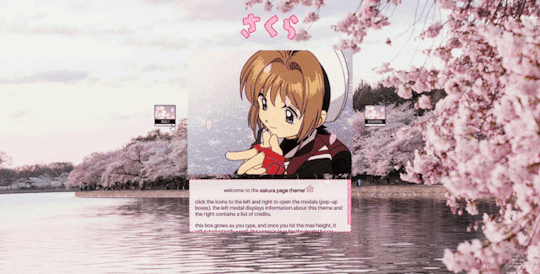
🌸 Sakura Page Theme 🌸
re-coded an unreleased page theme an anon asked me to release like 5 years ago (example of the original). realized i actually hated a lot of how it was originally handled and changed it up. now it is ready to be unfurled!
features:
mobile responsive (built with flexbox)
header designed for 4:3 ratio gifs/images
up to 2 side pixels (left & right) with optional captions
two javascript-powered pop-up modals
title font supports english & japanese
customizable fonts, images, and colors
CSS variable settings
tumblr controls removed (like the follow button)
...and more! just play around with it!
notes:
you must have javascript enabled for this page theme to work! see this post for instructions.
this theme is meant to be used with custom tumblr pages (select custom layout rather than standard layout and then copy + paste)
this can also be used on neocities or any other host that supports html/css/js.
🍃 code + live preview + more 🍃
73 notes
·
View notes
Text
The Japanese 3X3 Interval Walking Workout
The overarching principle of high-intensity interval training (HIIT) is that the harder you do an exercise, the more physiological benefits you accrue; thus, by incorporating intervals of higher intensity efforts in your workouts, you can get more fitness bang for your buck in less time.
When we think about HIIT, we tend to think about going absolutely nuts on a fan bike or doing all-out sprints.
But as Dr. Martin Gibala explained on the AoM podcast, while high-intensity training rises above the level of the moderate, it doesn’t require a complete max out of your heart rate, nor is it limited to certain exercise modalities.
You can do interval training by pedaling like a madman on a bike, but you can also do it with a less strenuous approach.
Enter Interval Walking Training (IWT), which originated in Japan.
This 3X3 walking workout is simple: you do 3 minutes of low-intensity walking (40% of peak aerobic capacity for walking — a little faster than a stroll), followed by 3 minutes of high-intensity walking (70%+ of peak aerobic capacity for walking). You repeat these interval sets at least 5 times, and do this 30-minute workout 4 times a week.
Your heart rate during the high-intensity intervals will vary according to your fitness level and age. One 68-year-old who participated in an IWT-based study had his heart rate go up to about 130 beats per minute during the fast intervals, so you’re moving at a good clip.
Even though IWT is highly accessible, studies that have been done on it show that it produces significant health benefits. People who did Interval Walking Training 4X a week for 3 months experienced significantly more improvement in their blood pressure, cholesterol, glucose, leg strength, and aerobic capacity than those who did continuous, moderate-intensity walking.
Hiroshi Nose, who developed Interval Walking Training, reports that among those who do IWT, “Physical fitness — maximal aerobic power and thigh muscle strength — increased by about 20 percent which is sure to make you feel about 10 years younger than before training, [and] symptoms of lifestyle-related diseases (hypertension, hyperglycemia, and obesity) decreased by about 20 percent.” IWT walkers enjoyed mental health benefits as well: depression scores dropped by half.
Walking in general is already one of the very best forms of exercise you can do, and IWT just helps you take its benefits up a notch. Hiroshi has used Interval Walking Training to get thousands of elderly Japanese citizens into shape, and it’s a great form of exercise if you’re in the older decades of life. But it’s also good if you’re just beginning your fitness journey and looking to get off the couch and start doing more physical activity. Even if you’re already a regular exerciser who’s in good shape, IWT is a nice way to mix up your usual neighborhood strolls while enhancing your health even further.
For more HIIT protocols, from the accessible to the challenging, listen to this episode of the AoM podcast:
Help support independent publishing. Make a donation to The Art of Manliness! Thanks for the support! http://dlvr.it/T5HkXR
6 notes
·
View notes
Note
Is there any reason sign language wouldn't work as a universal language? Like I can understand so many different types of sign language as you've talked about before but if it's something as simple as asking about food or directions, something just in the sense of travelling places and getting around, I would think that that could be manageable to teach people.
I've had a couple of people send me thoughts along these lines, and I wanna address it - because I understand the line of thinking and where you're coming from!
But I want to point out that the original question wasn't 'could something work as a universal language or not' - pretty much any language, in THEORY, could work as a universal language! Sign languages included!
So yes, if we decide to make, say, Japanese Sign Language the lingua franca of the world, COULD everyone learn it?
With limitless resources and a lot of effort, sure!

But the original inquiry (if I understood it correctly) was never about whether or not something COULD be a universal auxiliary language.
It was about which language, if any, would be the BEST one for it - the 'most practical', the one with the 'easiest' or 'most common' grammar, etc.
And the answer, unfortunately, remains largely the same.
Signed languages are... languages! And they're diverse and grammatically distinct, so the problems don't go away. There is no single sign language that is more 'standard' than any of the others!
The modality is different, so perhaps you're thinking about whether the difficulty hurdle would be more average for any non-signing people attempting to learn it. And perhaps it may facilitate a more equal ground for those people, sure. But what about people who speak a completely grammatically different signed language?
And that still wouldn't really fix any of the aforementioned issues. Sign languages also have grammar and syntax, and fingerspelling, and all those things will inevitably favor one group of language learners over another! It's a different gradient circle, but it's still a gradient circle with no middle.
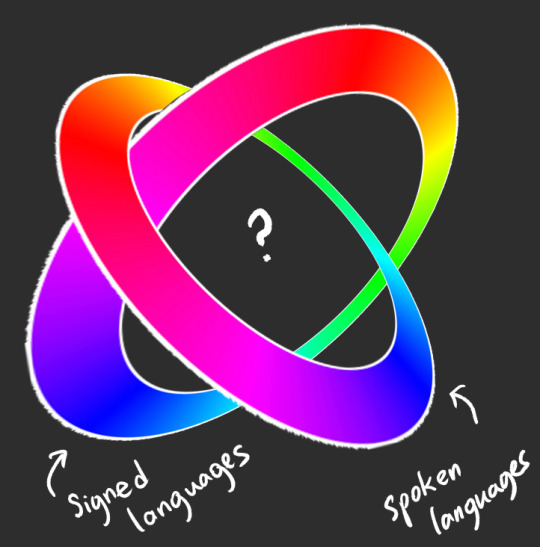
So to make it clear:
Could a signed language work as a universal language?
Sure! Any given language could.
Would a signed language be inherently more 'universal' than a spoken language?
No.
You mentioned that you believe it might be more manageable to teach people, but learning a signed language is just as complicated and frustrating as learning any given spoken language. :) And even if we made one for 'universal' use, it would inevitably fall into the same folly as Esperanto and the rest of them did. The only thing that changes is modality. ¯\_(ツ)_/¯
243 notes
·
View notes
Text
youtube
*I noticed this after posting the video, Bouquet of Heather.
"OH MY CAT!!!! The video was silent!!!!"
I've re-uploaded it, sorry.
youtube
昔つくった曲「ハビービー」の再々修正版と、「ハビービー」の英語+サイケ/エレクトロニカなアレンジ版「Bouquet of Heather」を公開しました。Bandcampから無料でダウンロードできるよ。
I released both the revised mix version of the song "ハビービー: Ḥabībī" that I made a long time ago, and the English + Psychedelia/Electronica version of the song "ハビービー" = "Bouquet of Heather".
Both songs are available for free download on Bandcamp.
https://isuzu-akatsuki.bandcamp.com/album/modal-fetter
Below are the lyrics for each.
+++
ハビービー
(The lyrics have changed slightly compared to the first version)
+++
“愛していたわ”
今の今までもずっと、変わらずに
“愛しているわ”
今後も何があろうと、変わらずに
解けない魔法のような愛を誓い合った―
私とあなた、それはまるで月蝕のようで
真昼と夜闇
あなたは月で私が太陽―
照らし続けなければ消えてしまう
そんな脆くも必然な恋でした
互いに惹かれ合うままに近付いては
あなたの闇に触れ―
荒れ地のようなその心に、
私までもが寒さに震えてたわ
荒涼とした風が吹く―
あなたという名の渓谷に
一条の温度を差したかっただけなの
過ぎ去った時間に
あなたは何故怯えているの?
昔むかしの幻影は
あなたが生み出した幻なのに―
暗闇の中でもがいてる
自ら作り出した牢獄の中で
ねぇハビービー、私を見てよ―
“愛していたわ”
今の今までもずっと、変わらずに
“愛しているわ”
今後も何があろうと、変わらずに
だけど、
どうか私のことを忘れて欲しい
それで、
あなたが暗闇から抜け出せるのであれば―
解けない呪いのような人生だと呟いた
あなたの声は、それはまるで月蝕のようで
夜闇と吹雪
あなたは月で同時に藍影―
覚めぬ眠りを願い続けてた
そんな脆くも儚い人でした
互いに惹かれ合うままに近付いては
あなたの闇に触れ―
荒れ地のようなその心に
私までもが寒さに震えてたわ
荒涼とした風が吹く―
あなたという名の渓谷に
一条の温度を差したかっただけなの
襲い来る幻影は
どうやら今は私の姿で―
今もあなたの心を
罪悪感の中に縛り付けていて―
暗闇の中でもがいてる
自ら作り出した牢獄の中で
ねぇハビービー、私を忘れて―
“もう私は過去なのよ”
+++
Bouquet of Heather
+++
Characters entwined,
Beaten pages in the book;
A story, fate forsook.
The chapters now closed,
But still echoes endure;
A dear, remains pure.
She's worried,
Watching him trapped in the past —
Buried in memories of agony.
He's haunted by ghosts of the way things were,
She feels his pain.
They're like a lunar eclipse,
Both shining brightly,
But not at the same time.
In his heart,
She's lost,
Like a relentless night.
Midday replaced by shadows,
Covered in fright.
in the fading evening twilight
anxiously wandering
i loved you deeply
a fire in my heart
but now apart
worlds apart
in solitude
often shed many tears
bereaved by the absence
the emptiness inside
i trying to turn the tide
maybe it's a waste of effort
but —
Gone from the glow
Like a lunar eclipse
With each passing day
As the days go by
Something is fading
From the shadows that haunt
No one be able to escape?
Slowly revealing
Emotions start to fall
why do you fear the ghosts
that have passed away?
all their whispers
they make you sway
haunted by memories
the chains won't let go
i feel your burden now
We're like a lunar eclipse
Both want to snuggle
Both want to walk together
Why couldn't we do those things at that time?
In your heart
I'm buried in pain and despair
In the fading evening twilight
Anxiously wandering
I loved you deeply
A fire in my heart
But now apart
Worlds apart
In solitude
Often shed many tears
Bereaved by the absence
The emptiness inside
I trying to turn the tide
Maybe it's a waste of effort
But —
+++
余談:Just a side note
+++
The song "ハビービー: Ḥabībī" is derived from my novel "Water Under the Bridge". And I hate this song. Out of all the songs I've written, it's the only one with lyrics that I can definitely say I hate.
Only one person in the novel utters the word "Ḥabībī". However, she only speaks with the nuance of "hey, bro!"

… And she's not the motif of this song; The motif is another woman named Erica.

The lyrics of this song in Japanese are, to put it mildly, "seriously shitty", so translating them into English was a real challenge.
Actually, the English version is almost completely different.
I can't just ship shit as shit. In that case, it would be faster to rewrite it from almost zero. And this time I did.
And since the English version is linked to this one (the Japanese version is the same, but it's hard to understand where they connect), I think if you listen to them together, you'll be able to see a creepy world.
youtube
Then the flow continues, those songs.
youtube
The novel it is based on is a story that depicts the quagmire of a man who is confused after losing the woman he loved, until the female protagonist mentally destroys and brainwashes him.
I'm planning to publish the second part of that story in print at the end of this month or next month.
#vocaloid#avanna#song#vocaloid songs#music#lily vocaloid#lily v3#electronica#aeropolis: alusthogrun#Bandcamp
7 notes
·
View notes
Text
VA - J Jazz Vol. 4: Deep Modern Jazz from Japan - Nippon Columbia 1968 -1981 - a new entry in BBE Music's excellent comp series
With J Jazz volume 4, the BBE J Jazz Bullet Train continues its journey traversing the expansive landscape of modern Japanese jazz. Volume 4 is the latest in the universally praised compilation series exploring the best, rarest and most innovative jazz to emerge from the Far East. Please take your seats for a first-class ticket to J Jazz central.
This latest station stop off is with the famed Nippon Columbia label, one of the biggest labels in Japan, whose jazz output embraces every possible style imaginable. Focussing on the key years 1968-1981, J Jazz volume 4 sees compilers Tony Higgins and Mike Peden dig even deeper into their record collections and pull-out tracks that span styles ranging from solo to big band, jazz classical interpretations and heavy jazz rock, to febrile post-bop, white hot samba fusion, and modal psychedelic wig-outs.
J Jazz volume 4 features icons such as drum master Takeo Moriyama, keyboard magi Hiromasa Suzuki, Fumio Itabashi, and Masahiko Satoh, and guitar wizards Kazumi Watanabe and Kiyoshi Sugimoto, alongside big band maestros and innovators Nobuo Hara and his Sharps and Flats, and Toshiyuki Miyama’s New Herd. Thunderous basslines nestle alongside glistening runs of electric piano, bubbling synths and air-tight drumming as the heavy psychedelic modal blues of Jiro Inagaki flows with the infectious samba grooves of Takashi Mizuhashi featuring Herbie Hancock; Shigeharu Mukai’s fusion funk epics take the music to another level and Mikio Masuda’s driving keyboard rhythms brings the heat to an incendiary dancefloor zone.
With 7,000 words of extensive sleeve notes, J Jazz vol 4 comes in a triple 180g vinyl set inside a deluxe gatefold sleeve with obi strip plus a 4 page insert. The double CD features two bonus tracks not on the vinyl edition. Mastered at the Grammy-nominated Carvery Studio by Frank Merritt, this latest collection is a worthy successor to the preceding three volumes that have set the bar so high.
J Jazz is curated for BBE Music by Tony Higgins and Mike Peden.
11 notes
·
View notes
Photo
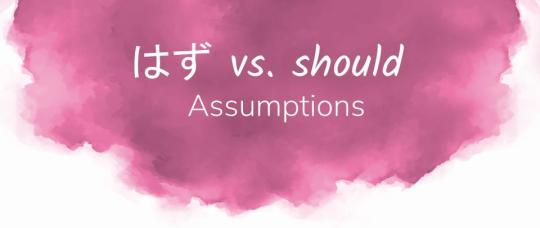
~はず - expressing assumptions in Japanese
For more phrases related to assumptions, go here. べき is here.
はず in English is usually defined as, be supposed to, ought to, should, must, be expected to (I believe). Great, lots of possibilities. However, the more options you have, the warier you need to be of the context.
You can indeed translate はず to should or be supposed to, but you can also translate should to** べき** or even ないと. And these are not as interchangeable in Japanese as they are in English. At least, that's my impression. Correct me if I'm wrong.
For example:
I should go home can be translated to そろそろ帰らないと。
You can say そろそろ帰るはずだ but the meaning changes to They should be on their way home by now.
The first sentence suggests (in an appropriate context) that you have to go home because if you don't go, you might get into trouble.
The second one, though, suggests an assumption. You don't know the truth, and you might get surprised by the final result.
But let's focus on はず only.
Let's take a look at the Japanese definition of that phrase first.
「はずです」は基本的に、「理屈上こうなる」という推論の結果としてのことがらを表わします。
The phrase "はずです" basically expresses something that is the result of an inference that "this is the way it should be in theory."
"In theory" guys! Theory means an idea that you believe is true although you have no proof, or it is a formal idea or set of ideas that is intended to explain something.
For example: 木村さんは英語教師ですから、英語が話せるはずです。
Mr. Kimura is an English teacher, so he should be able to speak English.
In theory, all English teachers should be able to speak English, but the reality might be different. Mr. Kimura's ability to speak English is explained by the fact that he is an English teacher (if that makes any sense to you)
この問題はN2の問題ですから、難しいはずです。
This problem is an N2 problem, so it should be difficult. However, not all N2 problems are difficult.
Note #1: はず often implies the element of surprise. While べき or other phrases, not really.
彼女は今、海外出張なので、今日は来ないはずです.
She is on a business trip abroad now, so she shouldn't be coming today.
To express a negative assumption about the future in English, you can also use will, for example, I doubt she will be coming; It's unlikely she will come; She won't come today.
Note #2: Will for future assumptions can also be used in affirmative sentences. She isn't on a business trip, so she will come. Will sounds like you're more sure of what you're saying. Should - you're less sure.
Note #3: In English, when we talk about assumptions that displease the speaker, we are more likely to use will instead of should.
Let's not go shopping now. The shops will be overcrowded.
In English, things might get a little bit tricky with assumptions about present situations. For instance,
Tom shouldn't know the address - I don't think he knows it unless the context suggests 'no one should tell him.'
トムは住所を知ってはいけない - no one should tell him, he is not allowed to know it
トムはアドレスを知らないはずだ - an assumption
Some examples from the manga Attack on Titan
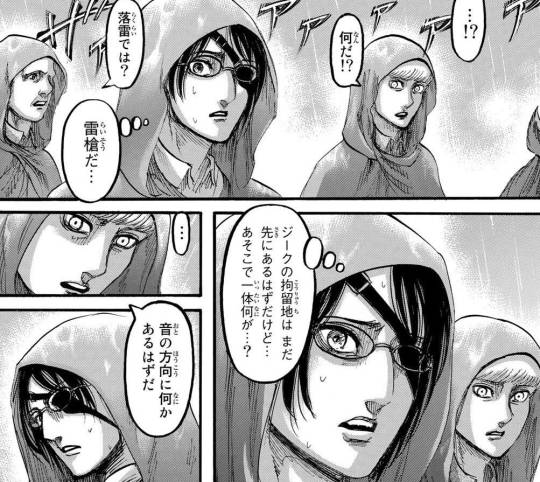
。。。先にあるはずだけど。。。
Context: They're heading to the place where they're keeping Zeke. She heard an explosion that sounded much like the one caused by the Thunder Spear. They haven't reached the forest yet. So why the heck can she hear it now?
Hange is theorizing in this case - she's developing an idea to explain the situation.
The first theory is that the forest is somewhere further in the distance. The place where they're keeping Zeke should be further ahead. (implicitly - if the Thunder Spear should be heard/used, it should be used there in the forest, not where Hange is).
The second theory is that "Something must have happened there" (in the place where the explosion was heard) or more literally "In the direction of that sound there must/should be something."
You wouldn't really use べき here because that would suggest an obligation, a rule as in "I ordered the forest to be further ahead."
If you tried to translate must to ないと or なければならない or any other "must form,” you would end up expressing a duty of some sort.
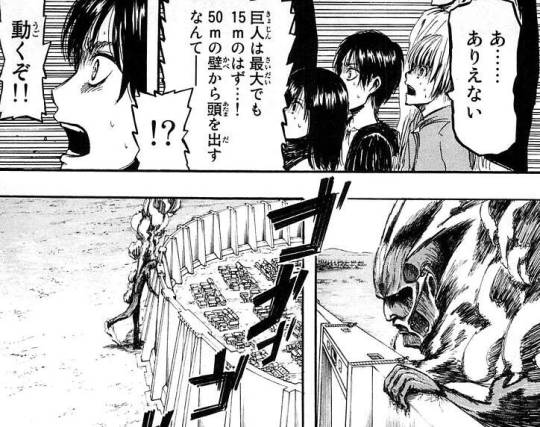
In this example, I believe baby boy Armin said it, they're recalling a theory related to the height of the titans. At most, they should be 15 meters tall. Their knowledge about the titans assumed that the tallest of them are 15 meters. That's the theory they formed, but who would have thought that there is a titan taller than the wall?
I hope this helps! And again, I'm learning just like you guys. If you have any comments, feel free to comment or repost it with your explanations! :)
38 notes
·
View notes
Text
わけ - definition (2)
What does ~わけ mean?
The same post in much higher quality is here
In this #Japanese with anime post, we will take a closer look at a mind-bending structure belonging to the realm of modality and, unfortunately, is usually omitted in translation. It's not that it has to be omitted; it happens that English just sounds better or makes sense without it (in most cases).
Examples in this post are from Jujutsu Kaisen Season 1 and Season 2.
Extra grammar:
というわけ vs. わけ
わけ vs. から/ので
Before we dive in
わけ is truly a mind-bending structure, and knowing just the dictionary definition is not usually enough. The examples provided in textbooks seem to be okay at first glance, but when you start analyzing and comparing わけ to other structures and grammar points, you quickly realize that you haven't fully grasped the concept it actually represents.
Long story short, though. In a lot of cases, わけ can be translated to 'so' or 'then' (: as a necessary consequence; Merriam-Webster).
However, in many cases, English translations don't need to include 'so' or 'then' because things can be simply understood from the context. As readers, we don't need extra lexical help to understand that something is a consequence of something else. The brain fills in that information naturally on its own. Japanese, though, decided that having extra lexical help could be useful.
Note: This article doesn't explain the meaning of structures like わけにはいかない or わけではない. They do have their English equivalents.
I also managed to compile a short list of things that literally enlightened me while struggling to understand what わけ really means and why we need it to sound natural.
In many contexts, わけ indicates that the partners in the conversation share some knowledge.
You really need context to be able to use it. If you were to just enter a room and say a sentence containing わけ, it wouldn't make much sense.
It is used as a reaction/to react to someone else's statement (dialog) or to your surroundings. It shows that you have realized/understood something. Could be paired with だから, それで、なるほど, which are placed at the beginning and わけ at the end, for example:
だから、五条先生強いわけだ。
Ah, so that's why Gojo-sensei is so strong.
Context: We were wondering why Gojo is so strong, and we just found out (someone told us) that Gojo is a six-eye user, and that made us realize why he is so strong.
It is used when the speaker performs a monologue. In this case, we can distinguish two possible situations:
emphasizing inevitable consequences of some actions, i.e. You eat a lot of sugar, so naturally you will gain weight. If you don't add わけ to such a statement, it will be fine as well, but it will sound like a dry fact. However, during a lecture or a conversation about eating habits and their consequences adding わけ will give your sentence the nuance of "And as you know...".
the speaker wants to restate/sum up their own words because their first explanation was unclear. It's like saying "I mean..."; "In other words..."
It is used to restate/paraphrase someone else's words (or your own words). Could be paired with つまり. For example, someone described something to you, but it was complicated. You want to make sure you understand the statement correctly, so you paraphrase it using easier words. You will end that 'easier' sentence with わけ or というわけ.
Used to give the reason for what the conversation partner has said or to state the logical conclusion. Remember that both parties in the conversation need to have the same knowledge. For example:
「田中さんが亡くなったそうだ。」"
I have heard that Tanaka-san has died recently."
「本当?心臓発作だったというわけだな。」
"Really? That must have been a heart attack." (source)
Context: Both of the speakers knew that Tanaka-san had some heart problems, and one of them drew a logical conclusion.
わけではない is used for correcting false impressions
In English, the tone of your voice and intonation will change the meaning of your sentence. In Japanese, though, such changes can be expressed through particle/verb ending choice. A good example can also be ~てしまう.
Consider this sentence:
I didn't invite him to the party because I didn't like him.
It could mean either:
1. I don't want to party with people I don't like. (から)
2. I had other reasons not to invite him, and not liking him wasn't one of them (わけではない)
Even though there are ways to translate わけ into English, it's often omitted in translations.
'Because ' in English is used to provide reasons, but it doesn't really matter if your conversation partner shares knowledge with you. 'Because' can convey completely new information or information already known to everyone for clarity's sake. わけ, on the other hand, speakers must have some prior, common knowledge.
In the following parts of the article, you will find more information related to the above points.
Definition of ~わけ
According to Jisho, it is a noun, and because it is a noun you negate it as a noun, and it conveys the meaning of:
conclusion from reasoning,
judgment or calculation based on something read or heard;
or it just translates to (as a standalone word)
reason; cause; meaning; circumstances; situation.
Stefan Kaiser in his book Japanese: A Comprehensive Grammar defines わけ as
a structural noun [...] used when the speaker realizes that there is an explanation or reason for some occurrence or phenomenon. Or [...] used when the speaker realizes that some fact or occurrence is the result of some other fact or occurrence.
The author mentions that it can be translated to 'so' or 'then'.
Following this definition, let's analyze our first example from Jujutsu Kaisen.
JJK; S01 episode 02 or 03; Yuuji just moved into the school dorms
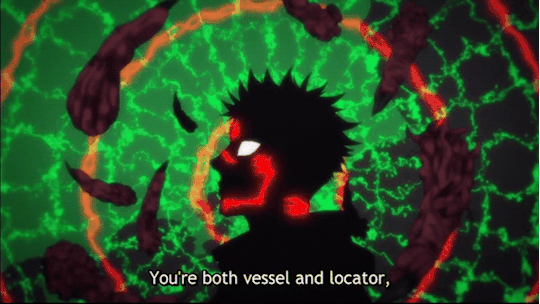
君の中の宿儺が力を取り戻すために指の在り処を教えてくれる. 君は器である同時に探知機、レーダーでもあるわけだ.
To regain its power, the Sukuna you consumed will direct you to the whereabouts of the fingers. You are a vessel as well as a radar.
To better understand this sentence, let's look at more context.
Yuuji has already eaten two of Sukuna's fingers. Since the fingers resonate with each other, he can kind of guess where they are or at least sense their presence (to some degree). Given those facts, we can surmise that Yuuji works like a radar, and that is what Gojo implies by using わけ.
In essence, わけ marks a logical conclusion or result based on some known facts.
Some known facts: Yuuji ate the fingers, they resonate with each other, and he's a vessel...
The conclusion from reasoning/realization: ...you’re a radar.
Notice that the English translation did not include any phrase that would introduce 'conclusion'. It is implied. You could include, for example, 'And that's why...' or something along those lines, but the whole line sounds better without it.
Let's elaborate on it, though. For those of you who don't overthink life or grammar rules, such short dictionary entries might be enough, but I'm a professional overthinker and I just need to know.
~わけ as a modal structure
This section is full of proper linguistic discourse, but don't shy away from it. It might actually help you deepen your understanding of this structure. Japanese grammar books for teachers, and grammar books written in Japanese, list わけ as a modal structure.
For a complete guide to modality, go here ⇒ Link Click
Modality is about a speaker’s or a writer’s attitude towards the world. A speaker or writer can express certainty, possibility, willingness, obligation, necessity and ability by using modal words and expressions. Speakers often have different opinions about the same thing. (Cambridge online dictionary)
Simply put, modal structures help you convey a variety of subjective nuances, for example, instead of saying, I'm wrong, you can say, I might be wrong (might is a modal verb). Let's see what subjective feelings わけ helps us convey:
Certainty or Conviction: わけ is often used when the speaker is confident or certain about the reason they are presenting. It signals that the speaker believes something is true based on their understanding or recognition of a situation.
Explanatory or Justificatory: It is commonly used to explain or justify a statement or action. It adds a sense of "it makes sense that..." or "therefore..." to the statement, showing that the speaker is not just stating a reason but also expressing their conviction or perspective on that reason.
Subjective Interpretation: わけ reflects the speaker's subjective interpretation or understanding of a situation, making it a modal structure because it conveys the speaker's attitude and belief.
An interesting observation has been made in an article titled 「わけだ」文と「からだ」文の意味の違いについて by 牟世鍾 and 宋洙珍 (I'm sorry, I can't decipher their names).
「わけだ」文が表す理由は、対象から納得し、それを理由として位置づけたもの、つまり、話し手が何か認識の過程を経て位置づけたまさにモダリティの形式であり、そのような認識․納得の過程のない直接的な理由を表す「からだ」文とは異なっている。
Which roughly translates to:
The reason expressed by the sentence わけだ is that the speaker is convinced by the object and positions it as the reason, that is, it is the very form of modality that the speaker positions through some recognition process, which is different from the sentence からだ, which expresses direct reasons without such a recognition/convincing process. (translation: mine)
In summary, the passage explains that わけだ places emphasis on the speaker's mental activity by which they become aware of, identify, and understand something (recognition). It involves perceiving, acknowledging, and comprehending information or stimuli in a way that leads to an understanding or recognition of a particular fact, concept, or situation. からだ, on the other hand, is more direct and simply states the reason without highlighting the speaker's internal thought process.
The article also states that
納得の形で提示した理由の文、つまり「わけだ」文は「からだ」文に置き換えられるが、その「からだ」文は「わけだ」文が持っているモダリティ的な意味はなく、単なる理由を表す文になってしまう。
Which translates to:
The statement of reason presented as a form of belief, i.e., the わけだ statement, can be replaced by the からだ statement, but this からだ statement does not have the modality meaning of the わけだ statement and becomes a mere statement of reason.
"A mere statement of reason" refers to a straightforward and explicit connection between the cause and reason; there's no room for confusion or subjective interpretations. Modality, though, is all about subjective interpretations.
For example, in the sentence "I'm late because of traffic," "because of traffic" directly links the cause (traffic) to the effect (being late), making it clear that traffic is the reason for being late. There is a straightforward connection between the two elements.
Okay, let's leave modality and that linguistic talk and move on to something lighter. However, continue reading this article to find out what is the best possible interpretation of Gojo's わけ.
A learner-friendly definition of わけ
After many talks with my Japanese teacher, we managed to pinpoint some reasons for using this structure and what speakers want to convey by using it. Our main goal was to determine why in some cases わけ is a much better option than から.
Let's go back to our Jujutsu Kaisen example:
君の中の宿儺が力を取り戻すために指の在り処を教えてくれる. 君は器である同時に探知機、レーダーでもあるわけだ.
To regain its power, the Sukuna you consumed will direct you to the whereabouts of the fingers. You are a vessel as well as a radar. (official translation)
In this case, and as you will see in other examples, わけ most likely conveys:
general/obvious statement. It means that all parties involved in the conversation share the same knowledge and the speaker just confirms everyone's understanding.
the speaker indirectly (through わけ ) asks "You understand, right?" / "You know what that means, right?"
Gojo realizes that Yuuji has enough information to understand his situation, but may or may not know the implications. Yuuji may not know/be sure what all of this means.
Gojo first provided Yuuji with a result and then he stated the reason why achieving this result will be possible. This can also give わけ the meaning of "So no wonder why you work like a radar."
In essence, わけ is used when there is shared knowledge about the situation and the speaker reinforces/confirms everyone's understanding, even when not prompted to do so.
If we replace わけ with から, we will end up with a sentence conveying completely new information to Yuuji. The context of this sentence would have to be different as well.
The original context involves Gojo walking Yuuji around the school and talking to him about the jujutsu world and Yuuji's position in all of this. Yuuji did not ask any questions during their walk, as some things had been explained to him before.
However, if Yuuji was oblivious to his situation and what having eaten the fingers meant for him and the jujutsu world, Gojo would have to provide him with some dry explanations/facts.
The important factor here is 'being oblivious/not knowing enough'.
Let's replace わけ with から then.
[...] 君は器である同時に探知機、レーダーでもあるから。
To regain its power the Sukuna you consumed will direct you to the whereabouts of the fingers. Because you are a vessel, a locator as well as a radar.
In English, it still might make sense, but as I mentioned at the very beginning, わけ is often omitted in translation. In translation, we call such cases 'problems with equivalence', which means that one language has something that the other doesn't have or doesn't use it as often as the first one.
If Gojo used から, it would imply that Yuuji didn't know that he was a vessel, that the fingers resonate with each other, and therefore he could be of help to everyone.
The exchange between them could look like this:
Gojo: In order to regain its power the Sukuna you consumed will direct you to the whereabouts of the fingers.
Yuuji:Why? / How come?
Gojo: Because you are a vessel, a locator as well as a radar.
Let's analyze another example from Jujutsu Kaisen.
Nobara just joined the team; S01; Ep03
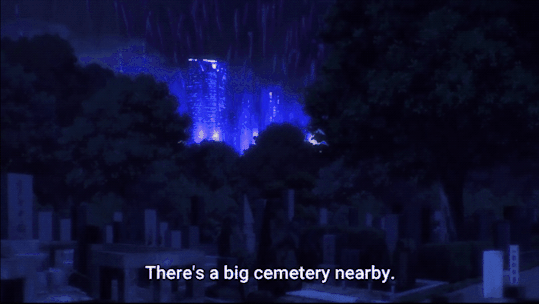
でかい霊園があってさ、廃ビルとのダブルパンチで呪いが発生したってわけ
There is a big cemetery, and the double whammy with the abandoned building caused the curse.
(again, no English equivalent of わけ)
というわけだ / ってわけだ are just more elaborate ways to express logical conclusions. It's often used with な-adj and nouns. There's a separate section on that, too.
In this case, Gojo gave our main trio two reasons why the curse might have shown up in the abandoned building. The building and the nearby graveyard are those reasons.
If we were to explain the use of わけ here in linguistic terms, we could say that わけ is used to emphasize that the occurrence of the curse is the logical result of the combination of two factors: the large cemetery and the abandoned building. It suggests that there's a logical connection between these two elements that led to the curse. It also adds a sense of logical inevitability.
However, explaining it through our 'learner-friendly definition' we could say that Gojo used it because:
all of them share the same knowledge, namely they all know why curses are born and what the combo of an abandoned building and a graveyard means (general/obvious statement).
It's not like they pulled up to the building oblivious to the world around them, and Gojo had to teach them the basics. Even though they did not ask any questions, he was confirming their understanding of the situation through わけ.
Gojo through わけ also implies something along the lines of "And as you can see..." or "As you probably already realized..."
It could also be the case that they immediately realized that the curse was there, but they didn't know why/weren't sure why. Gojo did not waste time, and instead of waiting for their questions, he supplied the missing information himself.
If we modified the sentence with から, it would still indicate that the curse occurred because of the combination of the large cemetery and the abandoned building. However, it would imply that the main trio didn't know that the connection between the curse being there and the vicinity of the graveyard and abandoned building mattered.
The conversation could go like this:
Gojo: There's a curse in this building.
Them: Why?
Gojo: There is a big cemetery, and the double whammy with the abandoned building caused the curse.
One more example from Season 1, Episode 2.
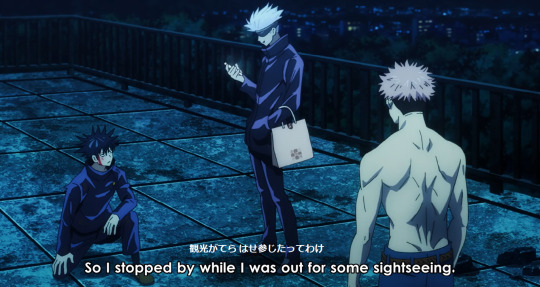
さすがに特級呪物が行方不明となると―上がうるさくてねえ 観光がてら はせ参じたってわけ
As one would expect when a special-grade cursed object goes missing, the higher-ups won't shut up, so I stopped by while I was out for some sightseeing.
In this case, 'so' perfectly captures the meaning of わけ, as Stefan Kaiser pointed out in his book.
A missing special grade cursed object is a big deal and sorcerers shouldn't take such cases lightly, which Gojo points out to Fushiguro, namely "[...] the higher-ups won't shut up."
Both Gojo and Fushiguro know about it as they belong to this community, which means they share knowledge.
While Gojo is telling Fushiguro why he came, he isn't providing him with new information. In this case, わけ has the nuance of "So you probably realize why I am here."
Because they belong to the same community, Fishuguro understands that ignoring special-grade cursed objects isn't the best of actions, and Gojo just reinforces/confirms his understanding.
One example from Season 2, Episode 8

準備ばっちりってわけだ。
The presence of わけ in this example might not be so clear at first glance. However, the English translations official and unofficial alike somehow manage to capture the meaning of わけ through "I see," which by many learners is instinctively translated to なるほど, though.
As always, we need more context.
Gojo since entering the Shibuya station began to collect information about the situation. He noticed some things that helped him understand/realize what was going on, namely his opponents (Jogo, Hanami, and Choso) prepared for the fight with him.
Through わけ, Gojo shows his realization. At the beginning of this article, I mentioned that わけ can be used as a reaction to someone else's statement. In this case, Gojo is not reacting to someone else's words, but to his surroundings.
In an alternate situation, Jogo or Hanami could also tell him: "Hey! We did this and that!" And Gojo could reply with: "Is that so? It means that you prepared yourself then" (drawing a logical conclusion/natural consequence).
So let's summarize what we have learned about わけ so far.
わけ is a modal structure, which means that the statements marked by it aren't facts but opinions/beliefs/thoughts.
It can be used interchangeably with から, but the nuance changes, and in some cases the meaning.
It marks logical conclusions, which by nature aren't hard facts.
It can also be used to give advice or make general statements based on a logical conclusion.
というわけだ is a more formal and elaborate way to provide a conclusion because there are more reasons stated and this helps us summarize everything.
わけ is used to explain the reason or cause behind something. It helps clarify why a certain situation occurred or why someone did something.
It is often used to provide an explanation or justification.
All parties involved in the conversation share some knowledge / have the same information.
You can't really use it without context, as opposed to から, which can be used without any context.
It conveys the nuance of "As you probably already realized..." or indirectly asks, "You understand, don't you?"
というわけだ / ってわけだ for restating some facts
Apart from というわけだ / ってわけだ being a "more elaborate way to mark logical conclusions", it can also be defined as a structure that paraphrases someone else's or your own words.
わけだ and というわけだ don't really change the meaning of the sentence, but というわけだ is used when the speaker provides more than one reason for something. It is often used with な-adjectives and nouns as opposed to わけだ, which is often seen after verbs. It's not a hard rule, though.
What does paraphrasing mean and why do we do that?
Paraphrasing means that you're trying to use your own words to show how you understand someone's statement. You have analyzed someone's statement and you drew a conclusion.
We do it because we are not sure of our understanding; in a way, we're asking our speaker to confirm our understanding. Modal meaning applies here as well.
In the previous examples, Gojo wasn't restating someone else's words. He was the one to introduce the information.
However, in the example below, Principal Yaga is restating Yuuji's reasons for joining the jujutsu world.
The interview with Yaga; S01; Ep02
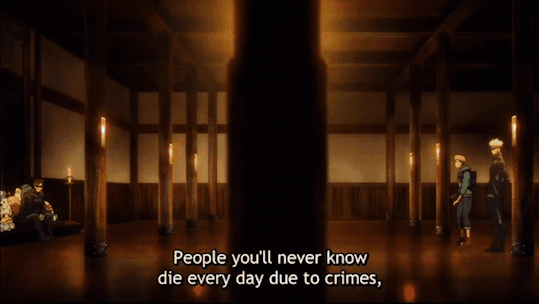
それが呪いの被害となると看過できないというわけか
Yaga just asked Yuuji why he wanted to join the jujutsu high school. Yuuji told him that leaving Sukuna's fingers as they are (unprotected/unsupervised) is dangerous. Yaga drew a conclusion from that, namely:
JJK; Chapter 3; Viz Media

In this case, we actually have something that is considered the equivalent of というわけだ namely, "So you're telling me that [...]". However, remember that not every "so you're telling me that..." needs to be translated to というわけだ.
In the very first chapter, the very first thing Fushiguro says to Gojo is, "You're telling me that someone is keeping a special-grade cursed object in a place like this?!" Fushiguro wasn't restating/paraphrasing Gojo's words.
We can assume that before this panel Gojo told Fushiguro: "There's a special-grade cursed object in the outdoor thermometer box." Fushiguro saw it and just repeated Gojo's words in disbelief, it was sort of a quotation.
Translation problems
In the above examples, わけ could be translated to 'so' or 'then,' but the aim of translation is to make sentences in the target language sound as natural as possible. We could rephrase all of them and include 'so' or 'then' or even any other synonyms, but if the context is clear enough, then including extra lexical help is simply redundant.
Here, we're also dealing with audiovisual translation, where the number of characters in a single line of subtitles matters a lot. Too many words in a single line may hinder the understanding or slow it down and lower the overall experience. And yes, even such short words as 'so' can do it.
Sources
https://briefjapanese.fun/how-to-use-wake/
my Japanese teacher and his native Japanese teacher
Stefan Kaiser, Japanese: A Comprehensive Grammar (p.285)
7 notes
·
View notes
Text
2023 Reading Stats
I read 76 books in total.
36 were written by men, 36 by women and 4 by others (i.e. non-binary). I wasn't intentionally trying to have a 50-50 split between men and women; it just worked out that way.
American (13), Japanese (9) and Canadian (9) were the most common nationalities of the authors of the books I read.
Those two things are the only author demographic info I've been recording as they're generally the most evident in brief bios.
The mean publication year was 1941, the median was 2004 and the modal was 2022.
I read 13 books from before 1900, 23 first published in the 20th century and 40 released this millennium.
I read 12 books published in 2022.
The oldest book I read was originally published, or well actually originally performed, in 431 BC.
I read four books that were published or completed in 2023 (Pale Lights Book One: Lost Things, Pale, Camp Damascus and Drinking from Graveyard Wells) but I'm not going to check which one was the most recently released.
35 or 46% of the books I read were translated into English.
My most read author was Engels (3). My second most read author was a tie between Arkady and Boris Strugatsky, Karl Marx, Graydon Saunders and Yōko Ogawa (2 each).
My average book rating was 2.935. This isn't actually on a five star scale but if you pretend it is you wouldn't be too far off.
I'm not going to name the sole book that got my lowest rating because it was by a self published author without an enormous profile so I'd feel like a dick if I did.
I didn't rate 14 books. 11 of these were non-fiction which I often don't rate but this also included De Sade's Justine, Medea, and Pale.
The three books that got my highest rating were Hav by Jan Morris, Nabokov's Pale Fire and The Silent Cry by Kenzaburō Ōe.
#books#misc reading#This says reading stats but it’s more new books read stats#Doesn’t include short stories (unless part of a collection)/fanfic/rereads/etc.
7 notes
·
View notes
Text
9th House: How do the Elemental groupings take interests of culture
Good day to you all! I wanted to write down how each elemental group takes interest in certain aspects of a culture. No sign, element or modality dictate what specific culture you lean towards nor dictates what certain aspects of culture you are drawn to exclusively. This means that you are more drawn to these aspects of a culture, which includes the influence of planets in the 9th house, aspects, and of course, your personal choice/will. I will constantly be using the word “a culture” and not “foreign culture” since the 9th House rule culture, not just foreign culture. Learning culture isn’t exclusive to traveling, especially now we have the internet to learn cultures though nothing beats being there yourself. That being said, here are the following groups that influence your affinity towards certain aspect of a culture in your 9th house (No planetary and aspects):
Fire (Aries, Leo, Sagittarius 9th House)
Interested in the brighter and optimistic side of a culture
Interested in a culture’s martial arts and its philosophy
Might enjoy a (healthy) competition with locals of that culture (Ex: Might want to horse race the locals who are renown for horse riding)
Enjoys learning about their religion/faith
Interested in activities that are popular in a culture (Surfing in an island culture for example)
Loves to join cultural festivities and parties
More interested in traveling the countrysides of their preferred culture’s country (Ex: I have a Leo in the 9th house and I would love to ride a horse in the countryside of Japan)
Could be interested on individuals of that particular culture who are popular and helped the country/culture in their own way
Earth (Taurus, Virgo, Capricorn 9th House)
Interested in the culture’s structure and how it operates day-to-day basis (This reminds me about Paolo from Tokyo’s videos wherein the majority of his videos talks about how your average Japanese works in Japan, specifically Tokyo)
Interested in the culture’s traditions from traditional clothing and traditional celebrations
Likely prefers the old school aspects of a culture
Takes special interest in a culture’s food and beverages
Likes to know how a culture promotes physical health (Ex. Dietary culture, popular physical exercises)
Interested in the general work culture of the culture. Also interested in how businesses and economy works in a culture
Loves to be in the countryside though probably less hyperactive than Fire on the 9th
Air (Gemini, Libra, Aquarius 9th House)
Interested in the culture’s language(s) and dialect(s)
May be interested in learning their sense of humor
Interested in how they communicate; how they conduct themselves socially/ knowing the social norms and mores
Interested in knowing the culture’s trends and fads
Interested in their education system
Interested in knowing what is progressing (Ex: technological advancement, values that are progressive for them)
Interested in what part of that culture is unique (Ex: Tipping in Japan is considered offensive in comparison to other countries. Japanese takes pride of doing great services and tipping indicates that they are not doing a great job while a country like the United States believes in the opposite)
Water (Cancer, Scorpio, Pisces 9h House)
Interested in the dark and cynical aspects of a culture (Ex: history of violent wars, war crimes, how a culture oppress their minorities, you get the memo)
Interested in the taboo side of the culture
Interested in knowing how the family structure works and how dynamic it is
Interested in their spirituality, philosophy, and mental health
Interested in the lesser known/mysterious part of a culture
Could be interested in knowing how a culture operates emotionally
Might be attracted to the occult aspects of a culture. Might research about cults (defining “cult” depends on the culture’s definition in combination of your own terminology)
#9th House#Aries 9th House#Taurus 9th House#Gemini 9th House#Cancer 9th House#Leo 9th House#Virgo 9th House#Libra 9th House#Scorpio 9th House#Sagittarus 9th House#Capricorn 9th House#Aquarius 9th House#Pisces 9th House#Fire 9th House#Earth 9th House#Air 9th House#Water 9th House#Culture#Foreign Culture
43 notes
·
View notes
Text
Mini-Update Time! TL;DR Learning a bunch of super cool techniques at a Teishin Workshop at my school, getting a very interesting tool, and joys of the day (:
I went to a day-long workshop at my school today to learn about something called a Teishin. Basically, using a Teishin allows for a form of needle-less acupuncture, and is used for acupressure as well. For more information on the Teishin and its' history, you can visit this site.
Anywho, they were selling some Teishins on a major discount today and here's what I snagged!

I got the copper one because I needed that length for my big hands, but also copper is anti-microbial, and I've heard that copper is able to conduct energy and qi better than other metals (gold is supposedly the best, though). Also, the short one is made of silver (not sure the carat). But the teacher sent in the order to his blacksmith, but something got screwed up somehow, and they were made like this on accident. However, they found that for some reason they are EXTREMELY sensitive to energy, and to Qi. It can with great accuracy help you find acupuncture channels and individual points as well.
I tried it myself, and I was honestly kind of shocked - the only time I ever felt a strong response to energy from something else like that was from strong crystals. This was like that, but like I said, this has an accuracy that crystals do not. There are apparently only like. 10 in existence. So I had to snag one ofc xD
But yeah! Learned some very cool techniques. Most of it is super gentle - you literally can barely even feel that there is metal there. There is some tonifying abdomen work that amazingly relaxes the whole body after some quick passes. And also there is a technique that we learned created by a Japanese neurosurgeon that is actually very pokey and stimulating, but is great for pain and numbness and regulation of the autonomic system.
Overall, I got what I came to the workshop for - I learned ways to work with and use acupuncture points, without needles. I learned how to tonify and reduce, and how to do that to channels, too. Being able to do it without needles means that I get to better experiment with points before I get my license (can't needle at home before then), but it also gives me a modality to treat people that can really be done anywhere, anytime, and is less invasive and painful for people that are needle-sensitive.
Other things from today - I also learned a technique to improve the sensitivity and energy capabilities in the hands - I will work on it and probably try and post it sometime. Also, my partner at the workshop is also a classmate that I've talked to basically twice in one of my other classes. Anywho, we chatted briefly and she casually mentioned that she does Reiki. I seem to be attracted magnetically to the people in the program that do Reiki haha that's so funny to me xD
While I'm at it, other Joys of the Day:
-Had Dave's Hot Chicken for the first time today, and it actually was really good
-TRASH GODDSSSSS PRAISE BE TO THEM!!
Got a really nice tall mirror, and another box fan! Just in time for the Summer months! I can't believe that so many wonderful and needed things have been finding their way to me, and I am extremely grateful for it (:
-Grateful for my partner and the love and companionship they provide
-A warm cup of tea in the morning (:
-TOTK! Definitely one of my favorite games ever. Love tucking into it at the end of a long day
I think that's it for now! Hope that everyone has a wonderful evening!
Blessings!
2 notes
·
View notes